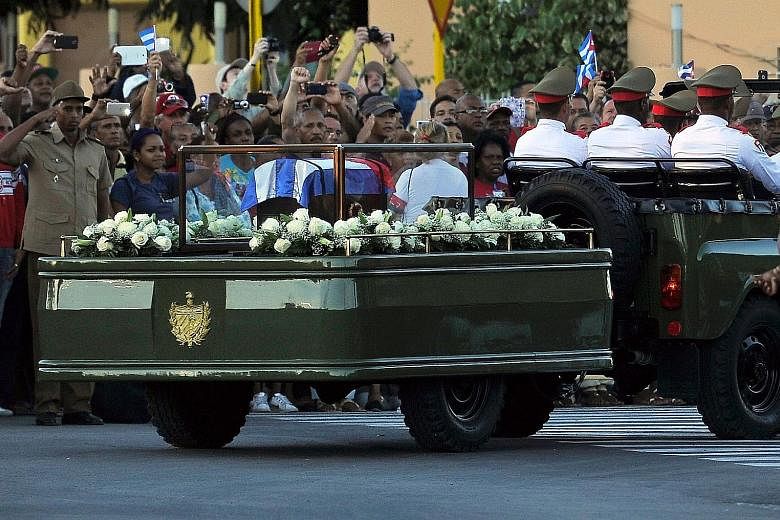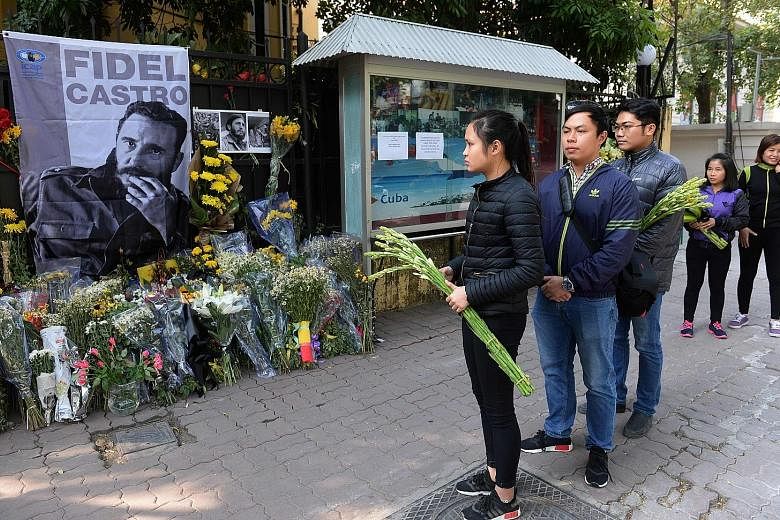SANTIAGO DE CUBA • Cuba opens a new era without Mr Fidel Castro, the communist leader who ruled the island for decades, as it buried his ashes yesterday.
Capping a week of tributes and mass rallies, a jeep pulled the cedar urn into the Santa Ifigenia cemetery in the eastern city of Santiago de Cuba as thousands chanted "viva Fidel".
Mr Castro, who died on Nov 25 at age 90, was laid to rest during a "simple" ceremony near the mausoleum of 19th century independence icon Jose Marti and other national heroes, said his brother and successor, President Raul Castro.
Official Cuban media at first reported that the events would be carried live on television, but hours before the ceremony was due to take place reported that it would be "solemn and private".
On Saturday night, Mr Raul Castro led a massive, final rally in his brother's honour at Santiago's Revolution Plaza, leading the crowd in a pledge to uphold socialist ideals.
While the late leader was sidelined by emergency intestinal surgery a decade ago, he remained a towering figure in Cuba.
He was revered by supporters for the free health care and education he spread across the island, and vilified by dissidents who saw him as a brutal dictator.
Although he was an omnipresent figure in the lives of Cubans, his dying wish was that no statues be erected in his memory and no streets or building be named after him.
The national assembly, which meets later this month, will pass a law to follow his order, said his brother.
The burial ends a nine-day period of mourning during which Cubans, often encouraged by the government, flooded the streets to pay tribute to him, chanting "I am Fidel!" as his ashes were taken across the Caribbean country.
Many held an all-night vigil at Santiago's Revolution Plaza, reading poems and holding pictures of the late leader.
"I feel a lot of pain, a lot of sadness. He's the father to all of us," said Madam Marina Brito Carmenati, a 66-year-old retiree who lives near the cemetery and woke up before dawn to bid farewell.
In July 1953, the two Castro brothers launched a failed attack on Santiago's Moncada military barracks, but it became the seed of a revolution that triumphed in 1959.
After taking power, Mr Fidel Castro became a Soviet ally and was a constant thorn in the side of successive United States presidents until illness forced him to hand power to his brother Raul in 2006.
Since succeeding his brother, the latter has implemented modest economic reforms in recent years, restored diplomatic relations with the US and vowed to step down in 2018.
"No longer under the shadow of his older brother, Raul may now feel freer to pursue the modest economic reforms he initiated in the last decade," said Dr Jorge Duany, director of the Cuban Research Institute at Florida International University.
While US President Barack Obama has chipped away at the US embargo's trade and travel restrictions, foreign companies still face obstacles to invest in Cuba.
Food supplies are tight and public services are being cut back while socialist ally Venezuela, which has been providing cheap oil to Cuba, is in the middle of a political and economic crisis, said Mr Ted Piccone, a senior fellow at the Washington- based Brookings Institution.
Mr Raul Castro needs to pick up the pace of reforms to kick-start the economy and ensure a smooth transition to his successor in 2018, he said. "The legitimacy of the post- Raul government will depend on a much better economic performance," said Mr Piccone.
As for the late leader, his legacy is not going to vanish overnight.
"Given his outsized impact on Cuba and the region, it's not really goodbye," Mr Piccone said. "His memory will cast a shadow over Cuba for a long time."
AGENCE FRANCE-PRESSE, REUTERS


